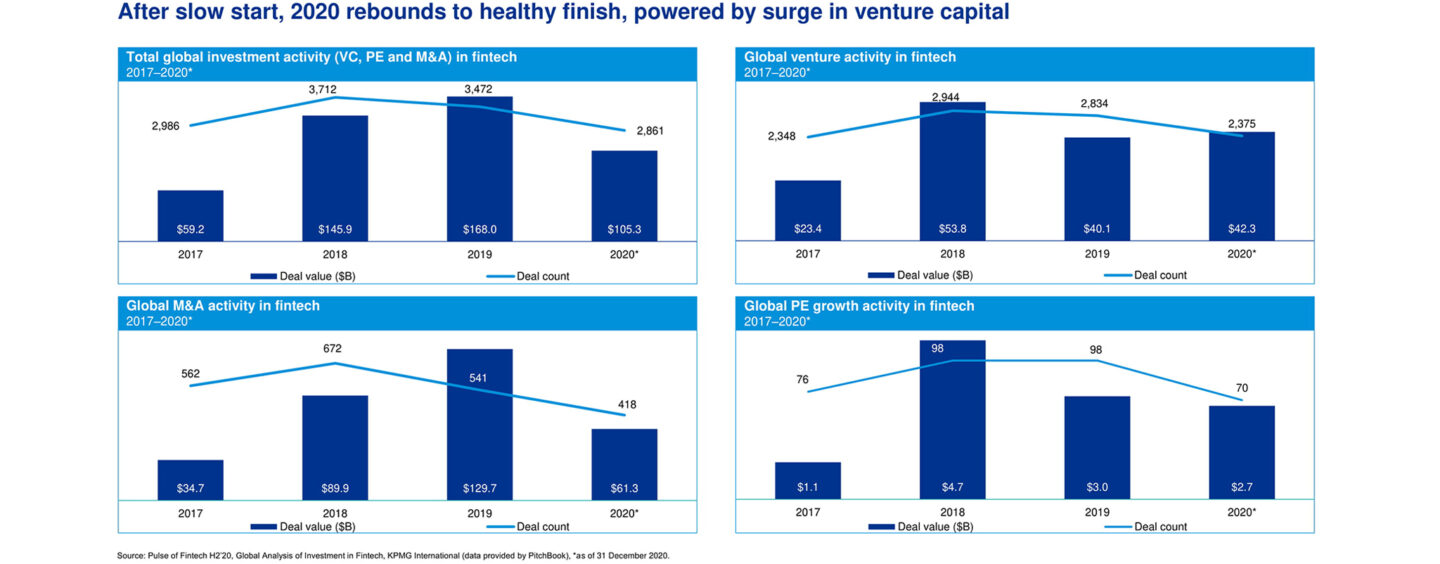KPMG report found that fintech companies in Asia Pacific attracted USD 11.6 billion across 565 deals from venture capital, private equity and M&A in 2020, compared to USD 16.8 billion in 2019, reaching a six-year low.
The pandemic saw a decline in investment into emerging markets like Southeast Asia, particularly in the second half of the year.
Global fintech funding was USD 105 billion in 2020, the third highest fintech investment on record despite a significant drop compared to USD 165 billion in 2019, according to KPMG’s Pulse of Fintech H2’20 report.
Total fintech investment in China was soft in 2020 at USD 1.6 billion, a decline from USD 4.8 billion in 2019 reflecting the maturity of its fintech sector, particularly in the payments space which is dominated by a small number of tech giants.

Andrew Huang
Andrew Huang, Partner and Fintech Leader, KPMG China says:
“In China, we are seeing growth in a number of emerging fintech sectors, including blockchain, regtech and wealth management.
One big change we have seen in 2020 has been the focus of these fintechs, with many now focusing their efforts on empowering traditional financial institutions rather than providing direct to consumer products.”
After Gojek raised USD 3 billion in Q1’20, the increasing uncertainty created by the pandemic drove a large amount of investment away from emerging markets like Southeast Asia, particularly in the second half of the year.
Nevertheless, the payments space showed the most regional resilience. After the global pandemic brought many deals to a halt in H1’20, H2’20 reversed the trend as investors and fintechs learned to do business in a new environment.
In H2’20, Australia-based eNett was acquired by US-based WEX for USD 577 million, Australia-based Judo Bank raised USD 209 million, South Korea-based Toss raised USD 177 million, and India-based Razorpay raised USD 100 million.

Insurtech continued to gain traction among investors in China. In H2’20, Shuidi, a crowdfunding platform which focuses on medical expenses, raised two rounds of funding totaling USD380 million.
Digital transformation of the insurance industry is being driven by the PRC government, insurance companies and technology companies alike. As a result, insurance service providers are likely to see structural reform continue, with more emphasis placed on innovative ways to prevent risks.
As mainland China forged ahead with real-world testing of its central bank digital currency, other countries began to evaluate their options, including the Federal Reserve, the European Central Bank, the Bank of England, that together set out a framework and requirements for offering central bank digital currencies.
Incumbent banks in Mainland China made significant investments internally in 2020 in order to transform their digital capabilities. Several also continued to set up subsidiaries in order to build their capabilities and provide B2B digital banking services to smaller institutions.
In Hong Kong, a majority of the eight digital banks licensed in the city launched services over the course of 2020. While their impact will take time to understand, they have already driven incumbent banks in Hong Kong to up their game in terms of apps, user interface, products and services.
The technology IPO market was also robust in 2020, while unicorn fintechs are increasingly considering IPOs given the recent successes and valuations achieved by unicorn companies.









